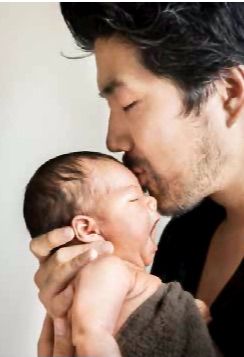Partner's guide to breastfeeding
How you and your partner choose to feed your baby is a really important decision. This page contains information on how you can support your partner.
Building a Happy Baby: A guide for parents
This video looks at the importance of developing close, loving relationships with babies in their early days and weeks. Responding to babies' needs for comfort and food is hugely beneficial for brain development and makes for more confident toddlers. Parents should be supported in breastfeeding responsively and keeping their babies close to help them become happy, healthy and secure children and adults.
Your support will help your partner and baby get off to a good start with breastfeeding. Breastfeeding can be a bit tricky for the first few days and they will need you to be encouraging and supportive. You can provide practical support so mum can concentrate on feeding the baby, or so that she can rest. Make sure that mum has plenty to eat and drink and that she doesn’t have to worry about keeping the house tidy or doing the washing. Keep the number of visitors limited. Above all, make sure you tell her often that she’s doing a brilliant job.
A dad’s view: “The important thing to remember is that it’s not the big things that make the difference but as many little things as possible. A cup of tea, a cuddle or telling great auntie Zelda that no, she can’t come and visit. Again. It’s being the arm around the shoulder without being dramatic about it.” Craig from Cardiff (Bump Baby and Beyond (Public Health Wales).

Your support is important
For many women, their partner is their main source of support with breastfeeding.
Many breastfeeding women give up sooner than they want to. You can be integral in keeping breastfeeding going. The more supportive you are, the longer your partner is likely to breastfeed and the more confident she’ll feel. While breastfeeding is a natural process, it is also a learned skill. Breastfeeding isn’t always easy at first and can take a few weeks for both mum and baby to get used to. Some breastfeeding mums go through a rough patch, but good support and encouragement from you can help her get through it.
How can you help?
Make sure your partner is comfortable while breastfeeding. Help her check the baby’s positioning and latch-on during breastfeeding (see tips below) and offer to adjust any cushions etc.
- While she is breastfeeding, bring your partner a drink, snack, pillow or footstool.
- Take on more of the housework yourself or get help, particularly in the early weeks. Make sure there is plenty of food in the house by doing the grocery shopping and cooking nourishing meals.
- Feeding mum is feeding baby – often babies feed a lot in the evening and this is a great opportunity for you to cook a meal for you and your partner.
- If you have older children, spend time with them so your partner can spend time with your baby or catch up on sleep.
- If your partner is considering stopping breastfeeding early on, encourage her to keep going by being positive and praising the progress she’s made so far. Providing reassurance, particularly when she’s tired or frustrated, will help boost her confidence.
- Too many visitors in the first two weeks can be exhausting.
- Get specialist help if your partner is experiencing difficulties with breastfeeding. Keep a list of phone numbers handy so you can easily call your Midwife, Responsive Feeding Service, Health Visitor, breastfeeding counsellor, or GP.
Please click here for additional information
Getting closer with your baby
With breastfeeding, parents do have different roles to play. While it helps to develop a strong bond between mum and baby, dads can sometimes feel jealous or left out. Try to remember that breastfeeding is just one aspect of caring for your baby. There are plenty of other ways to care for and be close to your baby.
Cuddle, bathe, massage, rock and lie with your baby on your bare chest – babies love skin-to-skin contact.
Get to know your baby (and help them get to know you) by talking, singing and playing games.
Get involved before and after breastfeeding – you can bring baby to mum, change their nappy, get their wind up and rock them to sleep.
You can also read stories, go for walks with baby in the pram or in a sling to give your partner some time to herself. The more you get involved with caring for your baby, the more quickly you’ll develop a strong bond. Babies often love the sound of their dad’s voice and the security of being held in their arms. Supporting your partner with breastfeeding is one of the most important things you will do for your child. Try to enjoy this time – it is busy and tiring but the rewards are amazing!




